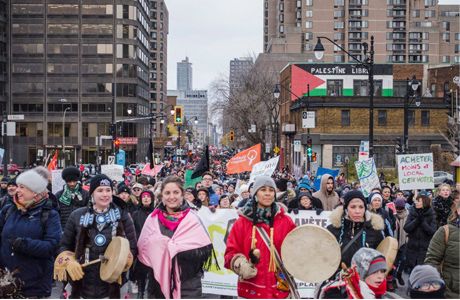News
You are here
50,000 march in Montreal for urgent climate action

November 12, 2018
Thousands took to the streets across Quebec on November 10th to demand the provincial government put forward a concrete plan to deal with the climate crisis.
In Montreal, 50,000 people joined the march called La planète s’invite au Parlement (The Planet Goes to Parliament) which is part of a series of demonstrations that have happened since early September, then called La planète s’invite dans la campagne. A citizen-led movement wanted to bring awareness to all political parties running in the election that they should have come up with a plan to prioritize a just transition to green jobs, divest from fossil fuels, respect Indigenous sovereignty and protect their land and biodiversity.
The last march couldn’t be ignored by elected officials nor mainstream media, as people made sure their voices were heard. As we marched from Place des Festivals to Mount Royal, we chanted “Changement, maintenant!”, “On marche pour qui? Pour la planète! – On marche pour quoi? Pour le climat!”. We filled up the streets as we agreed that radical change is needed to deliver an efficient action to stop global warming and environmental degradation.
The Coalition Avenir Québec (CAQ) government of François Legault hasn’t discussed clearly what their plan is to start transitioning to a green economy for future generations. Previously in the campaign’s early stage, Legault had no problem with the fracking industry and fossil fuel projects. But after the tornado that destroyed houses and communities in Gatineau and surrounding areas, the CAQ changed their message a little. However, they still didn’t offer concrete measures. On the party’s official page, general topics such as Green Economy, National Architecture and Planning Policy, Greenhouse Gas and Energy Efficiency are listed without any references nor real proposals.
On the other hand, Quebec Solidaire had a breakthrough in this year’s election, winning 10 seats as they ran a campaign supporting an energy transition program divesting from oil companies, providing better conditions for workers, public dental insurance, free education, and increasing the minimum wage. These are important measures and to fight climate change we also need decent wages and working conditions for people, instead of targeting individuals and how much time they spend in the shower. As per an article from The Guardian, in July 2017 by Tess Riley, it shows that 100 companies are responsible for 71% of global emissions.
The latest mobilization brought once again the following list of demands, which is also based on the Transition Pact (Le Pacte de transition), a document signed by 400 prominent figures in Quebec stating their commitment to put the fight against climate change as a priority and what needs to be done in the short term (2 years) to make progress on this matter.
1- Recognize that the climate emergency and the protection of biodiversity are the greatest challenges of our time, and raise public awareness about them.
2- Develop a climate plan that meets the International Panel on Climate Change (IPCC) targets of reducing GHG emissions by 45% by 2030 (compared to 2010 levels) and eliminating them completely by 2050. Provide a detailed annual report to the public on the progress towards achieving these targets.
3- Ban any new oil and gas exploration or development projects, and end all direct and indirect fossil fuel subsidies.
The Pact also demands that the government commit to "Adopting a strategy to ensure that the energy transition brings social justice for workers and their communities that will face economic impacts."
Indigenous peoples, political figures from Quebec Solidaire, workers from the CSN, the FTQ, environmental groups like Greenpeace and more political organizations were part of this event which shows a great level of solidarity and understanding about the importance of a mass movement that will keep us on a path to environmental justice.
More marches are already scheduled to happen through November and December to keep the pressure on. Groups will be marching in Quebec City by the end of the month and on December 8th, another event will take place in Montreal.
As time goes by, elections happen but climate related disasters continue to take place – clearly we must work now to tackle this issue. Mass movements are necessary, and we cannot allow political representatives to move backwards with policies and pursuing developments harmful to the environment. Climate change is already here and capitalism doesn’t rhyme with environmental justice. There is no Planet B – therefore, getting involved with progressive organizations and movements working on the ground to change this situation is essential to stop capitalism from destroying our world.
Section:









